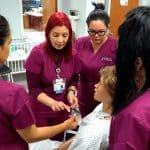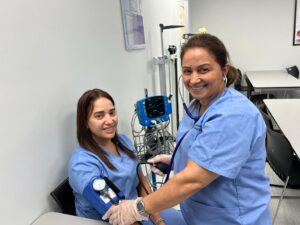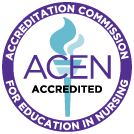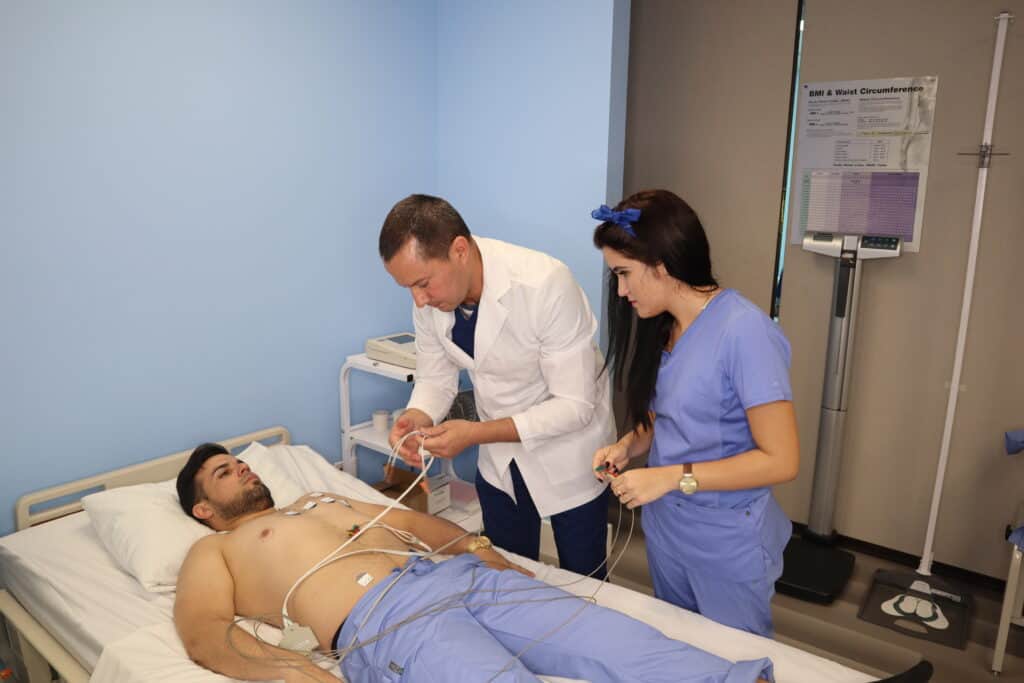
Florida’s healthcare system relies on hundreds of thousands of allied health professionals who keep hospitals, clinics, and long-term care facilities running every day. These are the skilled professionals who work alongside doctors and nurses to provide hands-on patient care, perform diagnostics, manage medications, and support essential clinical operations.
According to the Florida Center for Nursing’s 2022–2037 Workforce Projections Report, Florida faces growing demand across many allied healthcare professions. Nationally, the Bureau of Labor Statistics (BLS) also projects faster-than-average growth across allied health roles, driven by worker retirements and an aging population that needs more medical care. In fact, healthcare support occupations are expected to grow by 12.4% from 2024 to 2034, which is much faster than the average for all occupations.
This combination of national and state-level data points to one clear conclusion: now is an excellent time to consider a career in allied healthcare, especially in South Florida, where healthcare demand continues to climb.
What Are Allied Healthcare Professions?
“Allied health” refers to a broad range of clinical, technical, and administrative roles across all types of healthcare settings. Some examples of allied health careers include:
- Medical Assistants
- Pharmacy Technicians
- Patient Care Technicians
- Nursing Assistants / Home Health Aides
- Emergency Medical Technicians (EMTs)
- Phlebotomists
- Respiratory Therapists
- Diagnostic Medical Sonographers
- Radiologic and MRI Technologists
- Surgical Technologists
- Physical Therapy Assistants
- Clinical Laboratory Technicians
Allied health professionals make up a large portion of the healthcare workforce and are critical to Florida’s ability to meet patient needs.
Workforce Projections: What the Data Shows for Allied Healthcare Jobs
Both national and state workforce projections reveal significant opportunities in allied health.
National Outlook
According to the Bureau of Labor Statistics, allied health careers are expected to experience strong and sustained growth nationwide through 2034, with many occupations growing much faster than the average for all fields:
- Healthcare support occupations: +12.4% job growth
- Home Health and Personal Care Aides: +17% job growth
- Medical Assistants: +12% job growth
- Pharmacy Technicians: +6% job growth
- EMTs and Paramedics: +5% job growth
- Diagnostic Medical Sonographers: +13% job growth
- Respiratory Therapists: +12% job growth
- Radiologic and MRI Technologists: +5% job growth
Florida Outlook
At the state level, the Florida Center for Nursing projects similar trends through 2037, showing continued growth in demand for allied health roles, particularly in South Florida.
- Nurse Assistants: Supply is expected to decline by 14% while demand rises 39% statewide.
- Pharmacy Technicians: Demand is expected to grow by 23%, with approximately 1,700 new jobs needed in South and Southeast Florida alone.
- Physical Therapists: Supply increase of 12% is not projected to meet the rapid demand growth of 26%.
In both cases, the data shows how much Florida depends on new graduates entering the workforce to meet the needs of its aging and expanding population. The South and Southeast Florida regions are projected to experience the greatest need, reflecting rapid healthcare expansion in Miami-Dade, Broward, and Palm Beach counties.
Why Allied Healthcare Professionals Are in Demand
Several key factors are driving the increasing demand for allied healthcare professionals in Florida:
- Aging Population: Florida has one of the largest senior populations in the country, leading to a greater need for long-term and specialized care.
- Chronic Health Conditions: Common chronic illnesses like diabetes, heart disease, and respiratory conditions require ongoing diagnostic and clinical support.
- Workforce Retirements: Many experienced healthcare workers are retiring, creating replacement needs across multiple allied health fields.
- Expansion of Care Settings: Florida’s healthcare infrastructure continues to grow, with more hospitals, outpatient facilities, and home health agencies opening each year.
- Preventive and Outpatient Care: The shift toward preventive healthcare and home-based services has increased demand for allied health workers who support these settings.
Together, these trends make allied health one of the most resilient and opportunity-rich career fields in the state.
How Shortages in Allied Health Workers May Impact Florida
When there are not enough allied health professionals, the effects ripple across the entire healthcare system. Shortages can lead to:
- Longer patient wait times for lab work, imaging, and therapy appointments.
- Increased workloads for nurses and physicians, impacting efficiency and morale.
- Reduced access to home healthcare and rehabilitation services.
- Higher operational costs for hospitals and clinics that must hire temporary or traveling staff to fill gaps.
These challenges underscore the importance of training more allied health professionals to maintain high-quality care throughout Florida.
Why Now Is a Great Time to Pursue an Allied Health Career in Florida
For those looking to start or advance a career in healthcare, allied health roles offer an accessible and rewarding entry point. Many programs can be completed in under a year, allowing individuals to quickly transition into the workforce.
Key benefits include:
- Job security and flexibility across multiple healthcare settings.
- Meaningful, hands-on work that directly improves patients’ lives.
- Clear advancement pathways, such as moving from allied roles into nursing or healthcare management.
In South Florida, where population growth and healthcare expansion continue at a rapid pace, allied health professionals are especially in demand. From hospitals and clinics to long-term care and home health, opportunities for trained workers remain abundant.
How FVI’s Allied Health Programs in Miami & Miramar Can Help You Get Started
At FVI School of Nursing and Technology, students gain the practical skills and confidence needed to enter the healthcare workforce. FVI offers allied health programs in South Florida designed to prepare graduates for meaningful, in-demand careers in the field. Explore our allied health programs:
- Medical Assistant Program in Miami and Miramar
- Pharmacy Tech Program in Miami
- Patient Care Tech Program in Miami
- Nurse Assistant / Home Health Aide Program in Miramar
- Emergency Medical Technician (EMT) Program in Miami and Miramar
Program highlights include:
- Short program lengths, most under 12 months.
- Hands-on training through simulation labs and clinical experiences.
- Flexible scheduling options for working adults.
- Convenient campus locations: Allied Health Programs in Miami and Allied Health Programs Miramar.
- Financial aid available to those who qualify.
- Career services and job placement assistance after graduation.
FVI’s student-centered approach provides personalized support every step of the way, helping students build the skills and confidence to begin their healthcare careers.
If you are ready to take the next step toward a rewarding future in allied healthcare, contact us today to learn more about FVI’s programs and how to get started.


